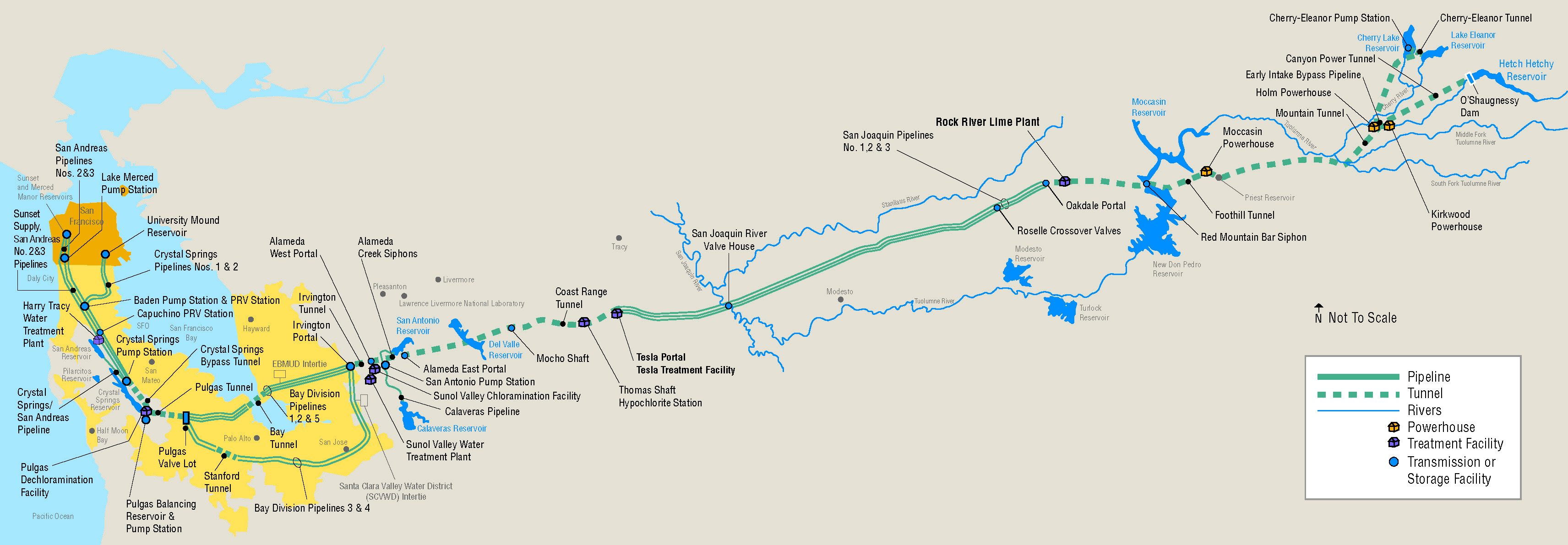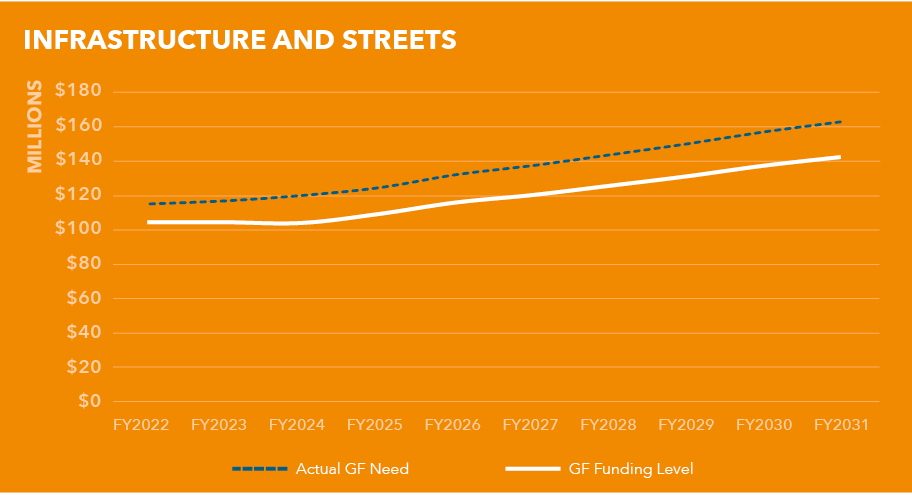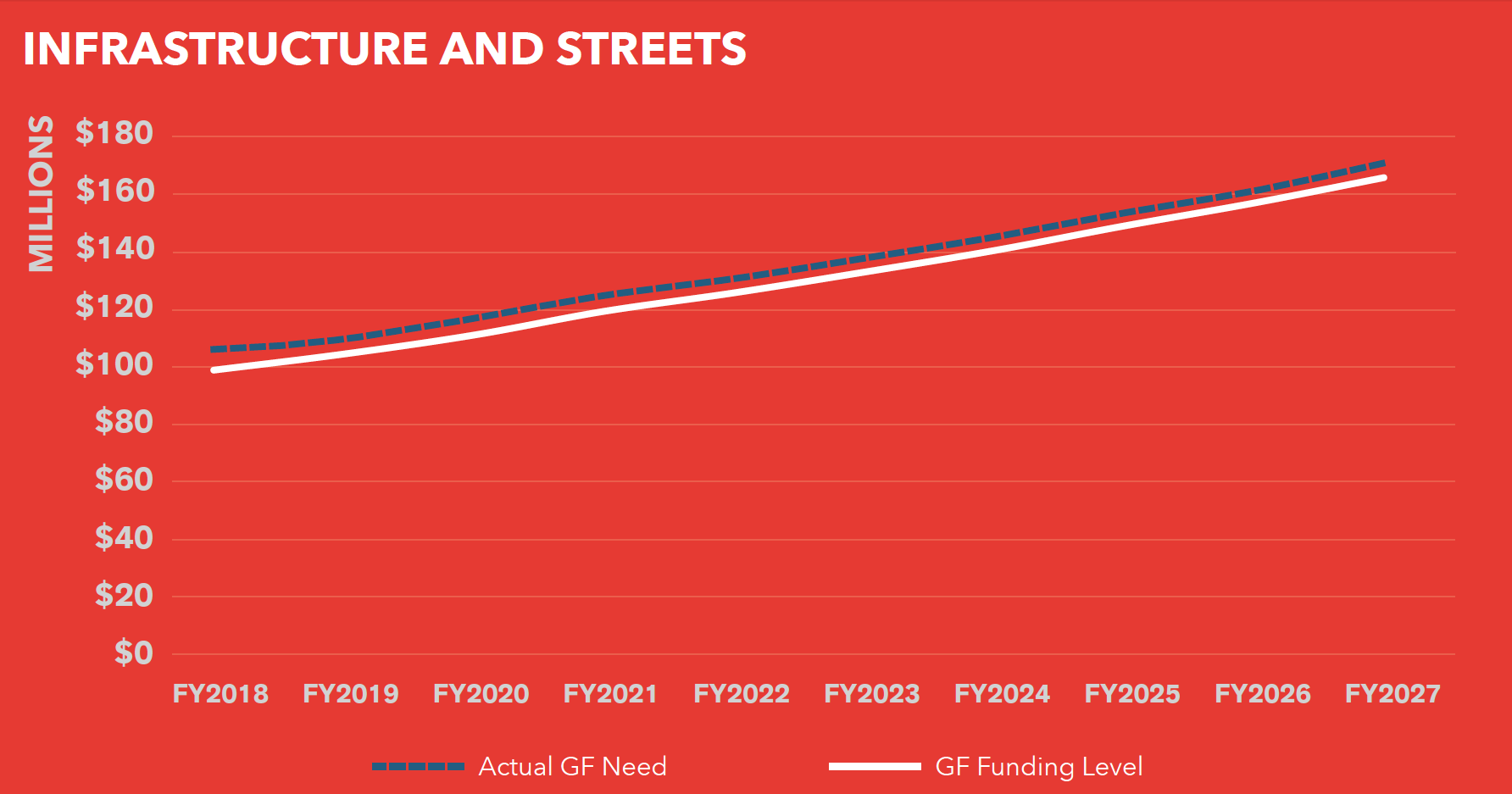| Project Name |
Description |
PW – Curb Ramp Inspection
and Replacement |
This project complements the Curb Ramp Program (see Enhancement section below) with funding to maintain previously installed ramps.
The estimated cost for curb ramp inspection and replacement is $21.1 million over the next 10 years. Given anticipated funding constraints, the Plan allocates $11.7 million from the General Fund towards this need.
|
| PW – Landscape Median Maintenance and Irrigation Repair |
As San Francisco replaces more cement and concrete with green spaces, investment in maintaining these areas keeps them free of trash and promotes the health of plants. With more than 175 landscaped medians and open spaces across the city, irrigation systems require routine maintenance and repairs to prolong their useful lives and keep the landscaping in good condition.
The estimated cost for median maintenance is $160.0 million over the next 10 years. Given anticipated funding constraints, the Plan allocates $68.7 million from the General Fund towards this need, in addition to $36.0 million expected from the State.
|
PW – Plaza Inspection and
Repair Program |
Public Works is responsible for maintaining plazas throughout the City, including Blanken Bayshore, Embarcadero, Hallidie, Harvey Milk, Justin Herman, Mechanics, Mendell, Organ Pavilion, and United Nations Plazas. These plazas require annual inspection to determine the extent of any repairs that may be required.
The estimated cost for plaza inspection and repair is $11.4 million over the next 10 years. Given anticipated funding constraints, the Plan allocates $6.3 million from the General Fund towards this need.
|
PW – Sidewalk Improvements
and Repair Program |
Public Works maintains sidewalks in three ways. First, the Bureau of Urban Forestry maintains sidewalks around city-maintained street trees. Second, the Bureau of Street Use and Mapping executes the Sidewalk Inspection and Repair Program; its goal is to inspect and repair every block on a 25-year cycle. Finally, the Bureau of Street Mapping has a reactive program called the Accelerated Sidewalk Abatement Program, which inspects locations based on complaints and issues notices of violation to property owners to compel them to repair their dangerous sidewalks.
The estimated cost for sidewalk improvements and repair is $49.6 million over the next 10 years. The Plan recommends fully funding this need, with $19.3 million coming from the General Fund, and the remainder from other local sources.
|
PW – Street Resurfacing
and Reconstruction |
Public Works oversees the maintenance of 865 miles of streets. Without regular resurfacing treatments, a street could end up costing the City four times more over the course of its life cycle. San Francisco uses the industry standard rating scale called the Pavement Condition Index (PCI) to score its streets. Public Works’ goal is to achieve and maintain a PCI of 75, which is considered “good” condition.
The estimated cost to achieve and maintain a PCI of 75 is $897 million over the next 10 years. The Plan recommends fully funding to achieve a PCI of 75 by 2025, with $543 million coming from the General Fund, and the remainder from a combination of federal, state, and other local sources.
|
| PW – Street Structure Repair |
The Capital Plan provides a strategy for the maintenance and renewal of 371 street structures including retaining walls, stairs, bridges, viaducts, tunnels, underpasses, and overpasses, plus numerous guardrails throughout the City. Work performed under this program includes general maintenance and major repairs of city street structures to maintain safety, proper operations of moveable bridges, and minimize long-term renewal costs. For this Plan, two major projects in this category include the Islais Creek and 4th Street bridges.
The estimated cost for the Islais Creek Bridge project is $102.0 million, with $11.7 million being funded by the General Fund, and $90.3 million from a Federal grant. The estimated cost for the 4th Street Bridge project is $22.6 million, with $2.6 million being funded by the General Fund, and $20.0 million from a Federal grant.
The estimated cost for other street structure repair is $70.2 million over the next 10 years. Given anticipated funding constraints, the Plan allocates $38.9 million from the General Fund towards this need.
|
PW – Street Tree Maintenance
and Sidewalk Repair |
Public Works is responsible for maintaining approximately 125,000 street trees. Proposition E of the November 2016 ballot set aside annual funding towards this need, and Public Works will have the resources to maintain street trees on an average three-to-five-year cycle, inspect all street trees annually, and make sidewalk repairs on a similar cycle.
The estimated cost for street tree maintenance and related sidewalk repair is $220.1 million over the next 10 years, fully funded by the General Fund through Proposition E.
|
SFPUC Hetch Hetchy –
Water Infrastructure |
The Water Infrastructure Renewal and Replacement program will include concept, development, design, and upgrades for operating, managing, and maintaining the Hetchy Water Infrastructure. In general, this includes water facilities from Hetch Hetchy Reservoir to Alameda East. The new and upgraded systems will have increased coverage, capacity or reliability, or improve employee safety and/or operating efficiency. The Hetchy water renewal program includes continued rehabilitation to the San Joaquin Pipeline. New projects include the San Joaquin Pipeline Valve and Safety Improvement Project to extend the useful life and safety of Hetchy Water assets and the Priest-Moccasin Water Transmission Line Project to build a new pipeline system to bypass the Moccasin Powerhouse.
The cost of SFPUC’s Hetch Hetchy – Water Infrastructure renewal and replacement projects is approximately $353.4 million through FY2029.
|
SFPUC Hetch Hetchy –
Power Infrastructure |
Many Hetchy Power systems, facilities, and equipment have reached their end of their life expectancy. Projects for Hetchy Powerhouses include upgrades to the powerhouse protection, control and monitoring systems, and equipment replacement and upgrades. The Capital Plan also includes rehabilitation of transmission lines and distribution systems, reliability projects that address North American Electric Reliability (NERC) requirements. Typical projects include replacement of insulators, switches, tower infrastructure, grounding, and protection, as well as regulatory projects. Two new projects are associated with dams and reservoirs for water storage and power generation: the Priest Reservoir Condition Assessment Project to assess updating the stability of the dam and the Cherry Elenore Pump Project to replace the pump at the reservoirs and upgrading systems.
The cost of SFPUC’s Hetch Hetchy – Power Infrastructure renewal and replacement projects is approximately $130.3 million through FY2029.
|
SFPUC Hetch Hetchy –
Water and Power Joint Infrastructure |
There are assorted SFPUC projects that will support multiple enterprises. Communications projects provide upgrades of the communication systems elements to maintain pace with the changes in technology, and to maintain overall system reliability. Upgrades to dams and reservoirs will meet the Water Levels of Service and Power Operational Objectives; funding is included for O’Shaughnessy Dam to improve the access and upgrade bulkhead, gate valves, and drum gates. The Mountain Tunnel will address deterioration in the concrete lining of the tunnel for continued reliability with a project plan more than $400 million less than anticipated in the last Capital Plan. Roads and bridges will make replacements and improvements as recommended in condition assessment reports and road improvements program to keep up access to Hetch Hetchy Water and Power facilities. Tunnels projects include the Canyon Tunnel-Hetchy Adit Rehabilitation to install a new reinforced concrete plug downstream of the existing plug. The new plug can be built while the Canyon Tunnel remains in service. Utilities projects will maintain the power distribution system in a state of good repair consistent with utility best practices to ensure 24/7 power.
The cost of SFPUC’s Hetch Hetchy Water and Power – Joint Infrastructure renewal and replacement projects is approximately $383.7 million through FY2029. These assets are jointly funded by Water (45%) and Power (55%) sources.
|
| SFPUC Wastewater – Collection System Spot Sewer Repair Project |
This project provides as-needed contingency-based repairs of existing sewer pipes for a city block or less in length. Current funding levels are projected to repair approximately 700 individual spot sewer locations per fiscal year to meet the targeted levels of service goals. It is anticipated that this base rate of spot repair will continue for the next several years and would ultimately decrease.
The cost of SFPUC’s Collection System Spot Sewer Repair Project is approximately $184.8 million through FY2029.
|
| SFPUC Wastewater – Condition Assessment Project |
There are more than 80 miles of major sewers that have been in service for 100 years or more and are at the end of their useful life. This project will confirm needs and provide recommendations for replacement or rehabilitation of major sewers as part of the Sewer System Improvement Program.
The cost of SFPUC’s Condition Assessment Project is approximately $41.9 million through FY2029.
|
SFPUC Wastewater –
Salt Water Intrusion |
Salt water corrodes the pipes and concrete of the sewer system. If it reaches the treatment plant in large quantities, it can harm or kill the biological secondary treatment process, cause discharge permit violations, and harm receiving water quality. Salt Water Intrusion projects reduce salt water intrusion into the sewer system with sewer pipeline joint sealing work.
The cost of SFPUC’s Wastewater Salt Water Intrusion project is approximately $9.4 million through FY2029.
|
| SFPUC Wastewater – Sewer Replacement/Improvement Program |
Failure of the collection system would reduce the City’s ability to handle and dispose of wastewater and stormwater, which could lead to public health, safety, and environmental risks and non-compliance with the State of California’s discharge permit. This program maintains the existing functionality of the sewage collection system and includes planned and emergency repairs and replacement of structurally inadequate sewers. This program allows for the renewal and replacement of approximately 15 miles of sewer per year.
The cost of SFPUC’s Sewer Replacement/Improvement Program is approximately $801.3 million through FY2029.
|
SFPUC Wastewater –
Treatment Plants |
The Treatment Plant Improvement program helps maintain the capacity and reliable performance of the Wastewater treatment facilities owned and operated by the Wastewater Enterprise. This is a continuing annual program to extend the useful life of Wastewater treatment assets including transport boxes, discharge structures, pump stations, force mains, tunnels, and treatment plants. The projects are prioritized based upon regulatory compliance, condition assessments, operations staff recommendations, and level of service goals, which were formally adopted as part of the SSIP.
The cost of SFPUC’s Treatment Plants is approximately $303.7 million through FY2029.
|
| SFPUC Water – Local Buildings and Grounds Improvements |
Capital improvements at City Distribution Division (CDD) facilities and structures are needed. Projects include a new fueling station, yard improvements to address health and safety issues and security, a comprehensive arc flash and electrical hazard study, and construction of a seismically reliable building for CDD’s communications and control systems. Additional funding is included for full replacement of the Newcome Yard facilities to address life safety standards for seismic events, building code requirements, and facilities past useful life.
The cost of SFPUC Water’s Local Buildings and Grounds Improvements is approximately $40.2 million through FY2029.
|
| SFPUC Water – Local Water Conveyance/Distribution System |
This program installs, replaces, and renews distribution system pipelines and service connections for the 1,230 miles of drinking water mains in San Francisco to meet customer level of service goals for uninterrupted service. The increased investment is needed to improve the annual replacement rate to 15 miles per year to minimize main breaks. Improvements include replacement, rehabilitation, re-lining, and cathodic protection of all pipe categories to extend or renew pipeline useful life. Additional projects include the Automated Water Meter Program, New Services Connection Program, and Town of Sunol Pipeline projects.
The cost of SFPUC’s Local Water Conveyance/Distribution System is approximately $617.8 million through FY2029.
|
| SFPUC Water – Local Pump Stations |
The SFPUC’s 12 major water pump stations and seven hydropneumatic tanks that boost pressure within the San Francisco distribution system need ongoing renewal and rehabilitation. This program includes funding to fully rebuild the McLaren Park pump station.
The cost of SFPUC Water’s Local Pump Stations is approximately $20.3 million through FY2029.
|
| SFPUC Water – Local Recycled Water Projects |
Projects in this program include the San Francisco Westside Recycled Water Project, funding new facilities to generate and deliver 2 MGD of recycled water for irrigation use in the western end of San Francisco. The project includes a new recycled water treatment facility consisting of membrane filtration, reverse osmosis, and ultraviolet light disinfection; a 1.1-million-gallon storage reservoir; distribution pumping facilities; and five to six miles of new pipelines.
The cost of SFPUC Water’s Local Recycled Water Projects is approximately $1.2 million through FY2029.
|
| SFPUC Water – Local Systems Monitoring and Controls |
This program delivers improvements to facilities that control and monitor San Francisco’s water distribution system. Facilities include enhancements to the System Control and Data Acquisition (SCADA) for remote monitoring of pressure, flow, and valve position status at key locations throughout the distribution system. This program will also fund installation of fiber optic communications to critical facilities and security installations not completed under the Water System Improvement Program (WSIP).
The cost of SFPUC Water’s Local Systems Monitoring and Controls is approximately $2.5 million through FY2029.
|
| SFPUC Water – Local Tanks/Reservoir Improvements |
This program provides long-term funding for renewal and rehabilitation of water storage reservoirs and tanks within the San Francisco Distribution System. Projects include seismic upgrades to the College Hill Reservoir Outlet, Merced Manor concrete wall and roof reinforcements, and Lombard Reservoir Geotechnical Improvements to stabilize the northeast slope of the reservoir and mitigate potential failure during major rain events.
The cost of SFPUC Water’s Local Tanks/Reservoir Improvements is approximately $5.6 million through FY2029.
|
SFPUC Water –
Local Water Supply Projects |
This program includes planning for local water diversification to explore alternative methods for expanding local water sources. Such sources include the Eastside Water Purification Project and Innovations for San Francisco ratepayers that highlight innovative water supplies and technologies.
The cost of SFPUC Water’s Local Water Supply Projects is approximately $5.5 million through FY2029.
|
| SFPUC Water – Regional Buildings and Grounds Programs |
This program provides funding for major improvements to the Sunol and Millbrae Yards. Sunol Yard improvements include LEED replacement facilities for maintenance shops and equipment storage, a new fueling center and administration building, re-surfacing of the yard, and demolition of six dilapidated structures. The project includes funding for the Sunol Watershed Center that includes exhibits, classrooms, event space, outdoor picnic and play areas, trails, and gardens representing the watershed. Millbrae Yard improvements include a new administration building to consolidate the Water and Wastewater laboratory, maintenance shop, and equipment storage, demolition of a large unused abandoned building, a new parking lot, and a new vehicle wash site. The upgrades address occupational safety, reliability, and functional regulatory compliance.
The cost of SFPUC Water’s Regional Buildings and Grounds Programs is approximately $61.1 million through FY2029.
|
SFPUC Water –
Regional Communications and Monitoring Program |
This project will provide much needed redundant emergency communications capability and increased bandwidth for security data transfer. Specifically, it will build a microwave backbone to link the entire SFPUC regional water system from the Hetch Hetchy Dam site in Yosemite to the rest of the SFPUC sites (San Francisco, San Mateo, Santa Clara, and Alameda counties).
The cost of SFPUC Water’s Regional Communications and Monitoring Program is approximately $11.1 million through FY2029.
|
| SFPUC Water – Regional Water Supply and Storage Program |
This program includes upgrades to structures to meet State Division of Safety of Dams requirements including geotechnical work, installation of monitoring systems, and a regional desalination project. The automated data acquisition system in the monitoring system will provide timely, accurate data related to inspections at various dams. This program will also include Regional Water Diversification Projects to explore alternative methods to expand regional water sources including a Regional Desalination Project, Indirect Potable Reuse Project, and Los Vaqueros expansion.
The program also includes the Daly City Recycled Water Expansion Project to provide 3.4 MGD of recycled water to customers of the Regional Water System and help offset groundwater pumping in the Westside Basin.
The cost of SFPUC Water’s Regional Water Supply and Storage Program is approximately $220.5 million through FY2029.
|
| SFPUC Water – Regional Water Transmission Program |
This program will provide upgrades to the Transmission System including pipeline inspection and repairs, valve replacements, metering upgrades, corrosion protection, and pump station and vault upgrades. As part of the pipeline improvement program, funding is included to monitor, strengthen, and replace older pipeline to achieve higher level performance and reliability. Included is funding to replace or slip line up to 10 miles of pipeline in densely populated areas.
The cost of SFPUC Water’s Regional Water Transmission Program System is approximately $289.9 million through FY2029.
|
| SFPUC Water – Regional Water Treatment Program |
This program includes major upgrades to the Sunol Valley and Harry Tracy Water Treatment Plants. Projects are identified through condition assessments, operations staff review, level of service and feasibility studies, and alternative analysis at each plant. Projects include upgrades of chemical dosage, flow monitoring, valve and pump replacement, and chemical handling upgrades. New projects include installation of ozone generators and power activate carbine units to address taste and odor issues at the Sunol Valley Plant.
The cost of SFPUC Water’s Regional Water Treatment Program is approximately $136.1 million through FY2029.
|
| SFPUC Water – Regional Watersheds and Land Management |
This program supports projects that improve and/or protect the water quality and/or ecological resources impacted by the siting and operation of SFPUC facilities. Projects include the repair, replacement, maintenance, or construction of roads, fences, or trails, the acquisition of easements and/or fee title of properties, and other ecosystem restoration or public access, recreation, and education projects. The Long-Term Monitoring and Permit Program provides resources to comply with terms and conditions in state and federal permits associated with construction and operation and maintenance of the PUC Water System.
The cost of SFPUC Water’s Regional Watersheds and Land Management is approximately $44.6 million through FY2029.
|
| SFPUC Water – Emergency Firefighting Water System |
The Emergency Firefighting Water System (EFWS) delivers high-pressure water necessary to fight large fires and is being jointly developed by the SFPUC and San Francisco Fire Department. SFPUC funds are planned to support the design and construction of earthquake resistant ductile pipeline to improve fire water and potable water supply reliability in the Sunset and Richmond neighborhoods.
The SFPUC has planned $53.8 million from Water Revenue Bonds over the next five years to support western EFWS water supply and pipeline projects. The ESER G.O. Bond is the primary source of funding for EFWS. For additional information on EFWS, including the ESER Bond Program and strategic direction about work on the west side, please see the Public Safety chapter of this Plan.
|





